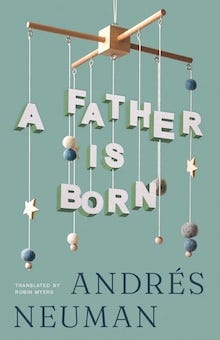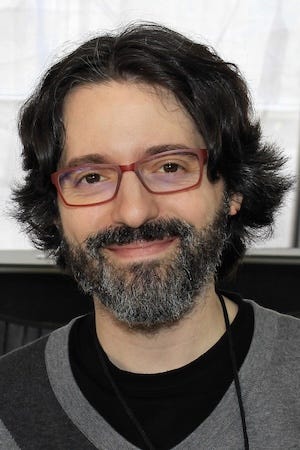New from Andrés Neuman: "A Father Is Born"
The latest book from Andrés Neuman & Robin Myers is a poetic exploration of fatherhood.
Following hot on the heels of last fall’s releases—Once Upon Argentina and Sensitive Anatomy—Andrés Neuman’s latest book drops today! A Father Is Born is actually two books put into one: “Umbilical” and “Small Speaker,” both of which Andrés wrote about his child, the first covering conception and his early years, the second focused on what changes for a parent once their kid starts talking.
For anyone who happens to be unaware of Neuman’s career, he published his first novel, Bariloche (translation by Robin Myers), in Spanish in 1999, followed by eight other novels (counting Umbilical and Pequeño hablante separately) including the much lauded Traveler of the Century, Talking to Ourselves, Fracture, and Once Upon Argentina (all translated by Nick Caistor and Lorenza Garcia). He’s also the author of one short story collection translated into English Things We Don’t Do (translated by Nick Caistor and Lorenza Garcia), several poetry collections, including Love Training (translated by Robin Myers), and the hybrid work, Sensitive Anatomy (translated by Nick Caistor and Lorenza Garcia).
All of these have been praised by critics and readers for their blend of high conceptual ideas with a great warmth and humanity, and have helped him to achieve worldwide recognition as one of the most inventive writers of our time, with the setting and scope of novels ranging from nineteenth-century Germany to contemporary Japan to Argentina during the “Dirty War”—with every one as gripping as the last.1
And now, with A Father Is Born, he turns inward, capturing the magic and anxiety and joy and fear of becoming a parent.
"I am delighted that we are together, my son, becoming what we will both be."
A man awaits his son's birth. Captivated, he follows the mother's pregnancy, imagining the child that will transform his house, his language, his relationship, and his family history. For a year, he annotates the memorable first steps leading the three of them into these new existential situations: being a father, a mother, a son; three different characters in a universal story, told in newly born words. A situation further complicated when the child begins speaking and articulating his world.
A Father Is Born is a lyrical tale that resonates both on intimate and collective levels. Its understanding of fatherhood faces masculinity with the miracle of life and its incessant rereading of the present. In a time that redefines traditionally attributed roles, A Father Is Born accepts Anne Waldman's invitation: "Tell the man to give up tumult for the while / To wonder at the sight of baby's beauty." But it is also, and above all, a love statement.
And to give you a taste, here are a half-dozen chapters from throughout the book:
I don’t dare invoke you too early, lest you disappear. But what if superstition works the other way around, and naming you confirms that you’re real?
You dangle by a thread. And yet you’re not fragile, because you don’t yet recognize your own fragility: you’re more like ours.
Little by little, I’m birthed as I speak to you.
Hiding their sex onscreen, they improvise a modesty yet unknown to them. Smudged at the center, they shirk labels, mischievous.
“Do you want to know?”
“No.”
“Yes.”
“We’re not sure.”
May you turn out to be a girl, a boy, both, neither. May you pay no mind to the genital scribble, its semantic blueprint.
And rewrite it with and over time, and feel its tingle, and celebrate it.
And I weep in the kitchen at how welcome you are. Not for lack of doubts (which I had) or fear (which I have), but because you’ve rowed right over them and into this place that smells of vegetables and fermented milk.
I spent my first year of life spitting up fluids, reality, sheer country. That’s what I was told. How did I ever grow up among lacunae? I don’t remember if I was welcomed there.
You can’t yet open your eyelids. It’ll take you a lifetime to debut the eyes behind them.
You can’t yet open them, but you have kidneys, a liver, a brain, a minuscule sampling of fingernails. In whatever we call existence, translucency can be a barrier.
You can’t yet open your eyes, and you’re already teaching us to see.
How to describe your little voice? Any attempt means a brush with failure, stutter, or cliché. All three are also mine, and they release me. I want our conversation free of any emotional police.
Your voice is the voice of a bird that doesn’t quite know what gurgling is. Of some indefinite instrument trying out its timbre. Of a bell at the window, of this very breeze.
It’s the voice of your inner monologue, the one I had at your age, the voice we recover by listening. Two neighbors chit-chatting forty years apart.
In the vast divide between the monosyllabic and bisyllabic realms, there’s room for two whole feet. My little one has transformed into a bipedal speaker.
Before, as if following a hermetic code, we had to guess which part he’d retain of every word, which scrap of sound he’d yank from it. Verbal communication, more deduction than dialogue, was rooted in polyvalent particles: ma, pa, ta, and so on, traversing infinite homonyms.
But now we’ve reached the revolution of two syllables. Their variants multiply in geometric progression, and misunderstandings begin to retreat. The world goes crisp and nuanced in his mouth, a lens focusing on what he says.
I can understand you, son. Now what?
Translated by Robin Myers, 2025
A Father Is Born by Andrés Neuman and Robin Myers is available from Open Letter Books. (As are Things We Don’t Do, Bariloche, Sensitive Anatomy, and Once Upon Argentina.) It’s also available from Bookshop.org and better bookstores everywhere.
For any and all Neuman fans, he did release a new book in Spanish this year, Hasta que empieza a brillar, which, according to Wikipedia is “A novel about the lexicographer María Moliner.” I suspect this will be an FSG book, but hopefully we’ll get it in English next year!!



